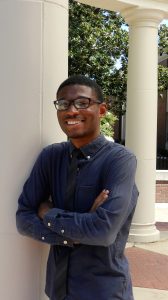Nothing is quite as satisfying as discovering one’s purpose in life. Larry Stokes found his niche while engaging in undergraduate research projects both on the University of Mississippi campus and through programs at other institutions.
A highlight of the junior biomedical engineering major’s experience was participating in a summer research program at Georgia Tech. The Clarksdale native began researching opportunities to participate in a Research Experience for Undergraduates program. Many REU programs are funded, in part, by the National Science Foundation.
Stokes said he believed that, in addition to his coursework, a research program would aid him in determining his goals postgraduation. This led him to the Cell Manufacturing Technologies, or CMaT, program in Atlanta, where he was partnered with a faculty member on the Georgia Tech campus.
“While working with the CMaT program, my project involved investigating the effect (of) inhibiting proteases, a type of enzyme in C2C12s, mouse muscle stem cell,” Stokes said. “To accomplish this, I had to culture the cells and administer different inhibitor treatment plans. Afterwards, I harvested protein from the cells and did protein analysis to see how the inhibitor affected protease levels and activity.”
In addition to looking at the protein itself, Stokes analyzed single cells to see how the treatment affected the viability of the cells. He also had the opportunity to learn a variety of skills that increased his interest in research.
The work taught him how to collaborate with people in the scientific community, and he learned the importance of data organization, data analysis and scientific communication. Now that he is back on campus, he hopes to continue participating in research within the biomedical engineering department.
Stokes’ introduction to research started when he was a high school student at the Mississippi School for Mathematics and Science. He participated in the “Heads in the Game” program, which was a partnership between the Ole Miss Department of Intercollegiate Athletics, the departments of Electrical Engineering and Nutrition and Hospitality Management, the Division of Outreach and X2 Biosystems. The program’s objective was to find ways to be proactive in preventing concussions.
Matthew Morrison, a former faculty member in UM’s electrical engineering department who now serves on the faculty at the University of Notre Dame, led the program. Both high school students and Ole Miss students engaged in research projects through this unique, cross-campus partnership.
“This program exposed me to the thought process behind creating devices that help solve a specific set of problems that patients suffering from traumatic brain injury encounter,” Stokes said. “After the program, I knew without a doubt that I wanted to pursue biomedical engineering in order to give patients suffering from various illnesses a second chance at life.”
A member of the Sally McDonnell Barksdale Honors College, Stokes said his coursework can be challenging. His favorite courses have been Introduction to Biomedical Engineering, and Material and Energy Balance. Stokes credited faculty members such as John O’Haver, professor of chemical engineering; Adam Smith, chair and associate professor of chemical engineering; and Glenn Walker, associate professor of biomedical engineering and electrical engineering, for their support.
“I have really enjoyed being a part of the School of Engineering here at Ole Miss,” he said. “The amount of support from faculty and my peers has been a great resource. Dr. Walker’s class really helped me figure out where I wanted to go with my engineering degree after graduation.”
Outside the classroom, Stokes is active with the Increasing Minority Access to Graduate Education, or IMAGE, program where he tutors other students. He is also the inaugural recipient of the Stephen H. and Linda B. Scott Scholarship from the School of Engineering. The scholarship is awarded to an outstanding current undergraduate student based on his or her academic record.
After graduation, Stokes hopes to earn a Ph.D. in biomedical engineering from either Georgia Tech or Vanderbilt University. Afterwards, he would like to continue engaging in research full time at a national lab or in the research and development department of a major company.
